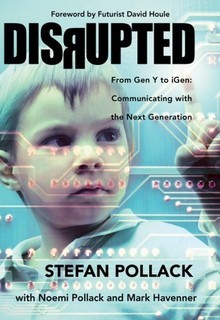The newest generation of consumers has blown traditional marketing to smithereens.
According to PR expert Stefan Pollack in his book Disrupted, the "iGen" generation are those born after 1994 and have never known life without computers and mobile devices.
When they want information, they want it instantly and on their terms.
Pollack says traditional media have always been the gatekeepers of communications -- news and advertising. But the iGen folks ignore information from radio, TV, and print. Instead, through social media platforms, iGeners are the first generation in history who decide what information they allow into their world.
If you are relevant to them, they invite you in. If you are real, they'll keep you and spread you to their friends, which Pollack calls the "infinite touch points." Once you're in, you'd better be who or what you say you are or you will be scorned. The scorn will instantly spread to those infinite touch points.
They are, for the most part, environmentally and socially aware and tend to support brands with the same philosophy.
They identify phonies in a cyber-beat.
Disrupted includes one-page case studies of companies who have succeeded with iGen and some who have failed miserably.
I asked Pollack five questions about his findings and the future of marketing/advertising.
1.Why have you labeled them the iGen generation?
Until now, most circles have labeled this generation Z, but based upon my observations there is enough of a generation gap between Y and this generation, that they needed a proper title. iGen describes much in just a few letters: they are inherently mobile, they value individuality, they are unique compared to the working generations of Y, Z and Boomers. The name also implicitly nods to Apple's iPhone and iPad, which, among other forces, helped instigate the great communications disruption of the last decade, empowering this generation to lead brands into a consumer-controlled environment.
2.How large is the disruption created by this new consumer generation?
To be clear, while iGen has certainly created a disruption in the marketing world, the reality is they are natives of a post-disrupted environment. They don't know a world apart from this intuitively mobile and consumer-driven one in which we currently live. iGen grew up knowing they have the entirety of human knowledge on small devices in their pockets. The consequences are staggering. Never before could a generation completely and totally omit a brand from their consumer decision-making process -- they can find out anything and everything without consuming one iota of traditional media or brand-controlled messaging. This is probably the largest disruption our industry has ever witnessed.
3.What do companies, large and small, need to do to connect to these consumers?
The most important thing brands can do is listen. Identify the target audience and listen to them, learn their behaviors, their wants and needs, and deduce how a brand or message can coexist or nurture that lifestyle -- then a brand or message will be relevant to iGen. Additionally, companies can identify influencers that iGen already listens to and capture their attention with a message. However, they will concede control of the message once the influencer becomes an advocate.
4.What do companies need to do to keep them?
Simple: be transparent, authentic, and honest. iGen and digital natives are the bloodhounds of consumers -- they can spot disingenuous marketing long before it reaches them. However, once a brand or idea is embraced by iGen, they become fearless advocates and behave as influencers in their vast networks.
5. What will advertising and marketing look like in five years?
At the velocity of current trends, advertising and marketing will need to adapt to correct for the massive ad-avoidance rates. Now that people are mobile, their attention is moving from TV and print to their devices. Mobile marketing will continue to be a leading force in the industry, but it will need to be targeted--both demographically and geographically. Specific niches, such as video and music streaming, augmented reality, and location-based promotions, have tremendous potential for success. iGen is not adverse to marketing or advertising as long as it is relevant and authentic. The days of sandblasting a controlled message and hoping that enough of it sticks are over. Marketers must be accurate with their analysis of target audiences and use only tools that appeal to them.

